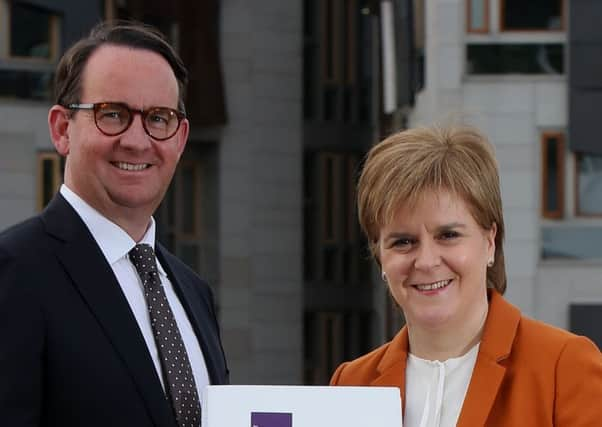Brian Wilson: Arguing about Gers figures is a ritual to deny reality


This is a relatively new fault line driven by the constitutional obsession. I find claims of “subsidy” almost as irritating as counter-spin about “improvement” when the figures give us by far the highest deficit in Europe, if Scotland’s finances are treated separately.
For decades until this nonsense began, nobody spoke of ”dividends” or “subsidy”.
Advertisement
Hide AdAdvertisement
Hide AdIt was an accepted fact based on fairness that Scotland has higher spending needs within the UK because of our geography, demography and social conditions. Hence the Barnett Formula.
Other parts of the UK also benefit (obviously) from above average spending but they are not aspiring to set up separate states.
The Scottish argy-bargy is required only to justify or dispute the contention that Scotland would be “better off after independence” for which GERS provides not a shred of evidence.
This debate is redundant. John Swinney, in his 2013 leaked paper, warned that pensions and services would be at risk in an independent Scotland because of volatile oil revenues – at a time when GERS figures looked a lot better for the Nationalists.
Since then, we have had the SNP’s own Growth Commission with a similar prognosis.
None of this will, or should, deter people who want independence, come what may.
In the meantime, however, maybe we could agree that most of Scotland’s current challenges arise from how money is spent – not fantasy politics based on there being more or less of it at some distant point on the constitutional radar.
A DANGEROUS ATTITUDE TO HISTORY
The 50th anniversary of “the Troubles” starting in Northern Ireland has been marked with little read-across to current politics. That is a mistake.
Advertisement
Hide AdAdvertisement
Hide AdIf there had been a political “backstop” half a century ago, thousands of lives might have been spared. If British politicians had paid attention sooner, the powder-keg might never have exploded.
Instead, the backstop became the British Army – initially to protect the besieged Nationalist population but soon drawn into a conflagration which moved rapidly from civil rights within Northern Ireland to the underlying issue of Partition.
This week, it took the President of France to put the “backstop” in its proper historical context, rising above the bluster of Boris Johnson and the manouevring of those who talk loudly of opposing “no deal” while offering nothing to resolve the issue that makes it most likely.
“There was war in this part of Europe until recently and those who play with that forget history too fast”, said President Macron. “…Irish peace is European peace and we should not weaken that just because of a British crisis.”
Every MP, whether Tory, Labour, Nationalist or Liberal who repeatedly voted to ignore that imperative in pursuit of some other outcome – no deal, second referendum, General Election – should ponder Macron’s words, then try to square consciences with intellects.
Refusal to accept the diktat of history – the need to maintain a border-free island of Ireland – has created this impasse. Those who speak most piously of European unity have been hypocritical in rejecting Macron’s maxim that underpinning “Irish peace” is essential to that objective, not an optional extra.
For 40 years, the scandal of Stormont was ignored by British governments. An artificial statelet, the rulers of which perceived discrimination and gerrymandering to be the necessary handmaidens of supremacy, was allowed to go about its business while civilised eyes were averted.
The Civil Rights Movement was adamant in its formative days that it was challenging these abuses within the Northern Ireland context. From the Unionist perspective, that was implausible because they believed equality in voting, housing and employment would soon erode their majority, leading inexorably to a united Ireland.
Advertisement
Hide AdAdvertisement
Hide AdWhile discrimination had its roots in sectarianism, it also had that political rationale. It took three murderous decades and sweeping reforms for it to be established that Northern Ireland could exist on another basis – power shared rather than monopolised. That was the triumph of the Good Friday Agreement.
Its miracle was the separation of two concepts which had hitherto been regarded as synonymous – partition and the border. The Good Friday Agreement did not end partition but it did, to all intents and purposes, dispose of the border – a device which was hugely facilitated by shared membership of the European Union.
This is history to which Johnston and all MPs who ignore current dangers seem oblivious. There are plenty in the Nationalist community who have lived with that compromise without fully accepting it. Twenty years ago, war-weariness and charismatic leaders sold them the border-free peace package.
No matter how it is dressed up, creating barriers to trade and movement within the island of Ireland will reawaken all of that and call the compromise into question. There is absolutely no need for it to happen and the “backstop” is a hypothetical precaution which underpins that fundamental principle.
Its elevation to centre-stage as the irremovable barrier to wider agreement – which the great majority could live with – has been as irresponsible as it is dangerous.
In case any MP did not notice, a trap was set this week which, if successful, would have killed innocent police officers in County Fermanagh. A few more episodes and the hand-wringing will begin – but without acceptance of political responsibility.
Fifty years ago, Ireland was sucked into the “war in Europe” which Macron spoke of because British politicians had walked by on the other side for so long.
Their heirs and successors should join every political party on the island of Ireland, apart from the DUP, in not only supporting the backstop – but comprehending why it is necessary, above and beyond other calculations and machinations.